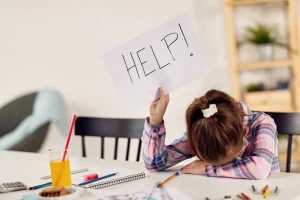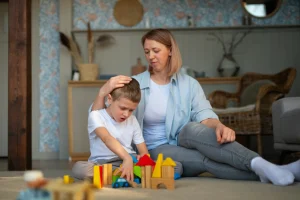Attention Deficit Hyperactivity Disorder (ADHD) is a neurodevelopmental disorder that affects children, often making it difficult for them to concentrate, control their impulses, and complete tasks. ADHD is a common condition affecting between 5% and 10% of children worldwide, and it can significantly impact a child’s social, academic, and emotional development.
ADHD Symptoms
The symptoms of ADHD can vary from child to child, but some of the most common include:
1. Inattention:
Children with ADHD often have difficulty paying attention to details and sustaining attention to tasks. They may seem easily distracted, forgetful, and disorganized.
2. Hyperactivity:
Children with ADHD may seem to be in constant motion, fidgeting or squirming in their seats. They may have difficulty sitting still and may be overly talkative or interruptive.
3. Impulsivity:
Children with ADHD may act without thinking, blur out inappropriate comments, or interrupt others. They may have difficulty waiting their turn and may be prone to taking risks or acting recklessly.
It is essential to note that while many children exhibit some of these behaviors from time to time, the symptoms of ADHD are persistent and interfere with a child’s daily life in significant ways.
ADHD Causes
The precise causes of ADHD are not fully apprehended, but research suggests that it may be a combination of genetic and environmental factors.
Some analyses have found that children with ADHD have differences in the structure and process of certain areas of the brain, particularly those involved in attention, impulse control, and reward processing.
Other factors that may increase the risk of ADHD include prenatal exposure to tobacco, alcohol, or drugs, low birth weight, and premature birth.
ADHD Diagnosis
Diagnosing ADHD in children can be challenging, as no single test can definitively identify the condition.
Instead, doctors typically rely on a combination of evaluations, including medical history, physical exam, and behavioral assessments.
Parents, teachers, and other caregivers may also be asked to provide information about a child’s behavior in different settings.
ADHD Treatment
Once a child is diagnosed with ADHD, treatment may include a combination of medication and behavioral therapy.
Stimulant medications are commonly prescribed to help improve attention and reduce hyperactivity and impulsivity. Behavioral therapy, such as cognitive-behavior therapy (CBT), can also be effective in helping children with ADHD learn strategies to manage their symptoms.
Depending on the child and family, the ideal ADHD treatment may vary. Close monitoring, follow-ups, and making changes as needed along the way are all components of effective treatment strategies.
Managing ADHD
In addition to medication and therapy, parents can take steps to help their children manage ADHD. For example, setting clear and consistent rules and routines can help children with ADHD stay on track and avoid becoming overwhelmed. A structured and organized environment can help children with ADHD focus and complete tasks.
Another helpful strategy is to divide tasks into smaller, more manageable steps. For example, if a child needs to clean their room, they may feel overwhelmed by the idea of tackling the entire room at once. Breaking the task down into smaller steps, such as picking up toys or putting away clothes, can help the child feel more in control and make the task seem less daunting.
Finally, parents must provide emotional support and positive feedback to children with ADHD. Many children with ADHD work with low self-esteem and feelings of frustration or failure, so it is crucial to acknowledge their efforts and successes, no matter how small. Encouraging hobbies or activities that allow children to channel their energy and creativity positively can also be helpful.
When to visit a doctor
See your paediatrician or primary care physician if you are worried your child may be showing indications of ADHD. It’s vital first to have a medical evaluation to rule out any other potential causes of your child’s challenges. Visit us at Children’s Health Hub; we have expert pediatricians to assist you and your child.
In conclusion, ADHD is a common neurodevelopmental disorder that can significantly impact a child’s social, academic, and emotional development. While the causes of ADHD are not fully understood, treatment typically involves a combination of medication and behavioral therapy. Parents can also take steps to help their children manage ADHD by providing their support.






